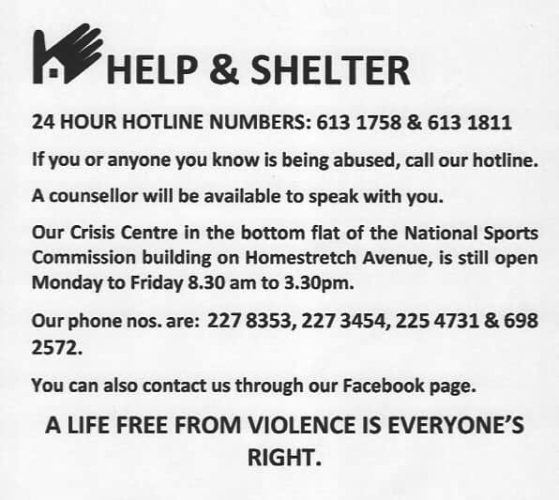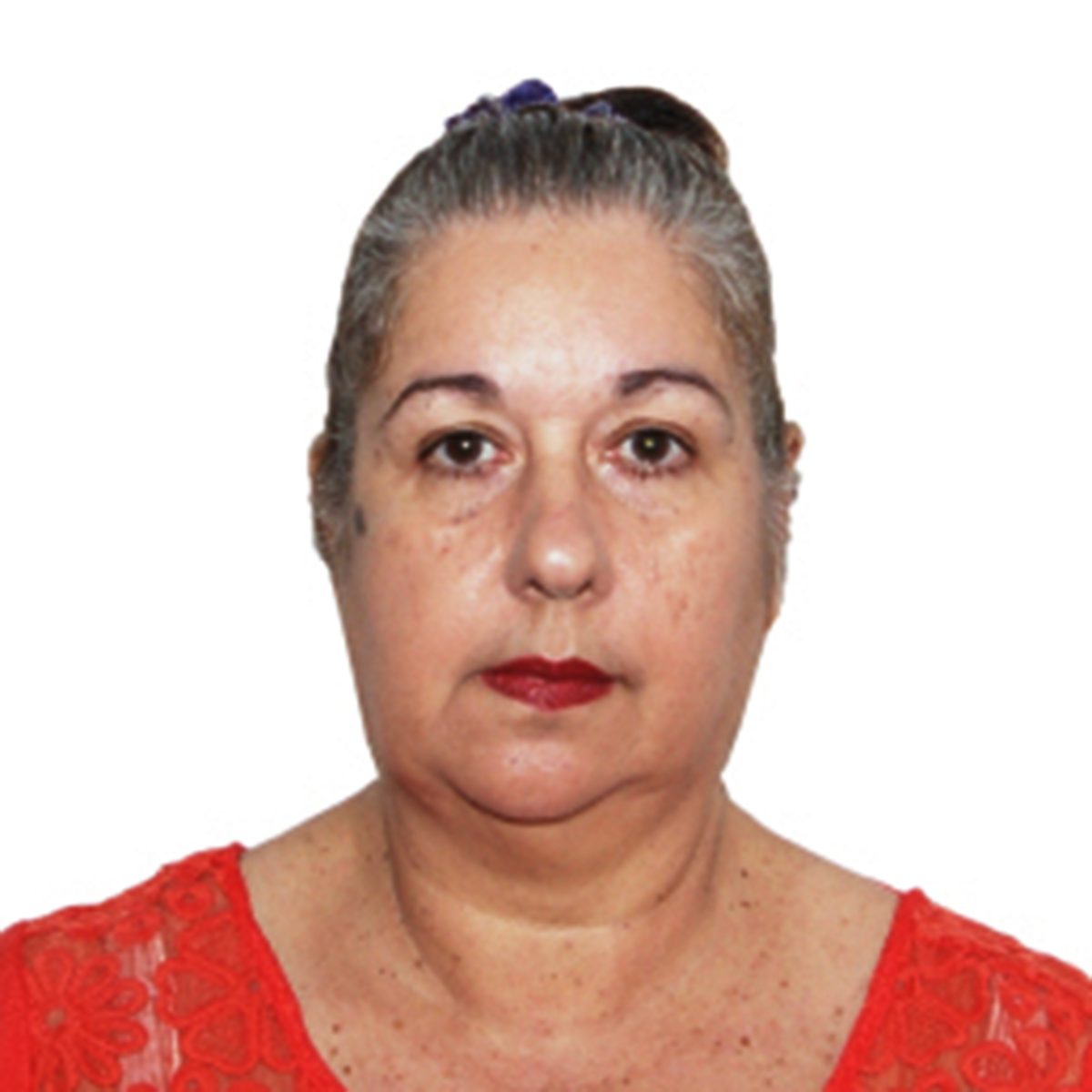Women’s rights activist Danuta Radzik has called on the government to heed the very recent calls of Secretary General of the United Nations António Guterres to increase funding for non-government organisations (NGOs) so they can continue to offer their specialized services and expertise in sexual and gender-based violence especially in light of the COVID-19 lockdowns that are occurring worldwide.
The Secretary General, in a global message, called on all governments to make prevention and redress of domestic violence a key part of their response plan for COVID-19.
Recently, manager of the Ministry of Social Protection’s Sexual Offences and Domestic Violence Policy Unit Akeila Doris announced that a helpline, has been established and persons can call same for assistance during lockdown, as Guyana battles the pandemic.
She also said that a safe shelter has been established and this can accommodate victims and their children under the age of 14 years. The facility has a full kitchen and pantry, dining room, living room, playroom, recreation room, internet access, bathrooms and laundry room, according to a report from the Department of Public Information.
 Radzik, a member of Help and Shelter, welcomed the announcement of an additional safe place for women fleeing domestic violence situations and an emergency hotline number coupled with the posters developed by the unit on safety from COVID-19 for residents in shelters and homes are commendable and very important information both for residents and staff.
Radzik, a member of Help and Shelter, welcomed the announcement of an additional safe place for women fleeing domestic violence situations and an emergency hotline number coupled with the posters developed by the unit on safety from COVID-19 for residents in shelters and homes are commendable and very important information both for residents and staff.
However, she recommended better networking and coordination between state agencies, NGOs and community service officers in the fight against COVID-19.
“We feel that the voice and perspectives of women are hardly visible in the Civil Defence Commission (CDC), Task Force and other bodies with responsibility for addressing COVID-19 in Guyana,” Radzik told Stabroek Weekend in an interview.
She pointed out that while the recent survey on domestic violence in Guyana found that over half of women in Guyana had experienced domestic violence, the voices and plight of victims and survivors of gender-based violence including domestic violence and child abuse are not being heard. This is so even as women are the ones who bear the brunt and overall responsibility of taking care of children, families and households all over the world.
According to Radzik, Help and Shelter is happy that nurses, the majority of whom are women, are being given additional support as they care for COVID-19 patients and others in hospitals, health centres and emergency medical centres. She suggested that the David G buses be mobilized all over this country to transport nurses to and from work and while at work special consideration should be given for other forms of support based on their needs.
Further, Radzik believes in this critical time that special police units must give support to adults and children experiencing sexual and gender-based violence and other forms of abuse.
“We understand the challenges, but the solution cannot be removing victims and their children while abusers are left in homes and residences scot-free. There will never be enough shelter or homes for this,” she said.
And according to Radzik, indigenous communities seem to be largely ignored as it relates to the COVID-19 response. She called for equitable support of all kinds to be given to hinterland, riverain and indigenous communities. She noted that history has shown that many indigenous peoples were wiped out during epidemics. We should learn from this lesson, she added, and ensure they are given all necessary support for the health and safety of the first peoples of Guyana.
In a recent letter to the newspapers, Help and Shelter, Red Thread, Childlink Inc, Blossom Inc, and United Bricklayers called on the Ministry of Public Health and the Ministry of Social Protection to take all measures to ensure that health, education, child services, police and social service agency frontline workers are alerted to the increased risk of sexual and gender-based violence and the increased risk for children of physical, sexual, psychological abuse and neglect.
They asked that standard operating protocols outlining steps for recognizing and identifying domestic violence and child abuse survivors, support and assistance, including referral numbers and addresses for state and NGO support services, and adequate transportation to places of safety when and if needed be put in place immediately.
Radzik said since that March 23rd letter, Help and Shelter received funding through a kind citizen for advertising its two toll free hotline numbers from GTT, its Crisis Centre numbers and the location of its Crisis Centre.
Continuing face-to-face counselling
And while many are on lockdown, Radzik said, it is the position of Help and Shelter that their counselling and shelter services are essential services, and face-to-face counselling is being offered at its Crisis Centre on Homestretch Avenue, below the National Sports Commission’s offices. Online counselling and advice is available through its hotline service and its Facebook page.
The organisation’s Ixora Shelter for women and girls who are survivors of sexual and gender-based violence, including domestic violence and Trafficking in Persons and their dependent children, is open and all of its services are available and free of cost.
Radzik disclosed that there is 24-hour security to ensure the safety of clients.
But the organization is cognizant of the dangers of COVID-19 and Radzik said that at both the Crisis Centre and Ixora Shelter standard procedures for safety from the pandemic are in place.
“At the Ixora Shelter, we have installed a handwashing station outside of our main building for sanitization of hands etc before entering the main building. At our Crisis Centre hand sanitizers and face masks are made available for all our walk-in clients and our counsellors and for staff and residents at our Ixora Shelter,” she shared.
Meanwhile, Radzik commended the decision of the Guyana magistracy to keep law courts open to hear domestic violence matters, which she believes is in keeping with the call by the UN Secretary-General. She suggested, however, that as many courts as possible put in place special measures for audio links and Skype to be utilized so that such matters can continue to be heard and protection orders granted, and sent online to complainants and respondents and nearby police stations.
She also suggested that the Ministry of Public Health’s COVID-19 hotline routinely ask all callers about their safety and the safety of their families from domestic violence and child abuse.
“They should have a standard message to give, which includes ‘domestic violence is a crime and unacceptable,’ guidance on how to report such abuse and numbers for online psychosocial help for persons experiencing domestic violence,” Radzik.
She further suggested that the hotline agents have immediate access to numbers of NGOs or state agencies offering services for sexual and gender-based violence and child abuse including shelter services and offer transportation services for such persons for their safety and safety of their children.
Vulnerable
Radzik pointed out that in Guyana there are many single-parent households and these families are particularly vulnerable because should the caregiver or parent get sick or die there will be no one to care for the children.
“Young children cannot be left on their own without necessary support. The CDC must ensure that single-headed female households with children are a priority for in-kind support and assistance and the welfare of children must be addressed through national [COVID-19] hotlines,” she suggested.
Radzik said they are aware that sexual violence will be on the increase. She noted that responsible community leaders sometimes know those families where children are particularly vulnerable, these can be identified as far as possible and either responsible non-offending community policing groups and individuals can be mobilized to do checks on such families and be trained to ask the right questions, with proper safety gear. NGOs as well can offer online psychosocial support in such cases.
“Perpetrators of sexual violence need to be removed from homes and brought before the court. This is non-negotiable. Financial and in-kind support must be made available to these families so mothers do not have to make the terrible choice between sexual abuse of their children and financial support for basic needs such as food etc, especially in these times of unprecedented crisis,” Radzik said.
The women’s rights activist stated that the sexual and reproductive health of citizens cannot be ignored and therefore essential care packages and hampers must include supplies of sanitary pads, condoms, birth control pills, baby diapers and wipes for babies and toddlers, morning-after pills or emergency contraception must be freely available at all health centres.
Further, advisories about sexual and reproductive health, safe sexual practices including contraceptive methods and prevention from STIs, including HIV, must be disseminated widely. She is of the belief that not enough media, communication experts and artists are being utilized to create safety messages for different age groups, men, women, teens, persons with disabilities, LGBTI populations on all the different topics referred to above.
Meanwhile, Radzik said that as an essential service Help and Shelter needs face masks and disposable gloves for its Ixora Shelter.
Important numbers to call during this period:
Help and Shelter Psychosocial counselling, shelter for abused women their children and TIP women and girls 225-4731, 227-3454, 227-8353
Red Thread Peer counselling and referral support for abused women and children 227-0909, 227-2575, 641-7326, 646-5075
Blossom Inc Child protection and support for children and families affected by sexual abuse Emergency contact 680-6700
ChildLink Inc Counselling for children and families experiencing any form of violence 223-3500, 227-2023, 623-8496
United Bricklayers Psychosocial counselling and support for SGBV, child abuse, suicide, substance abuse 696-9803, 683-0283

